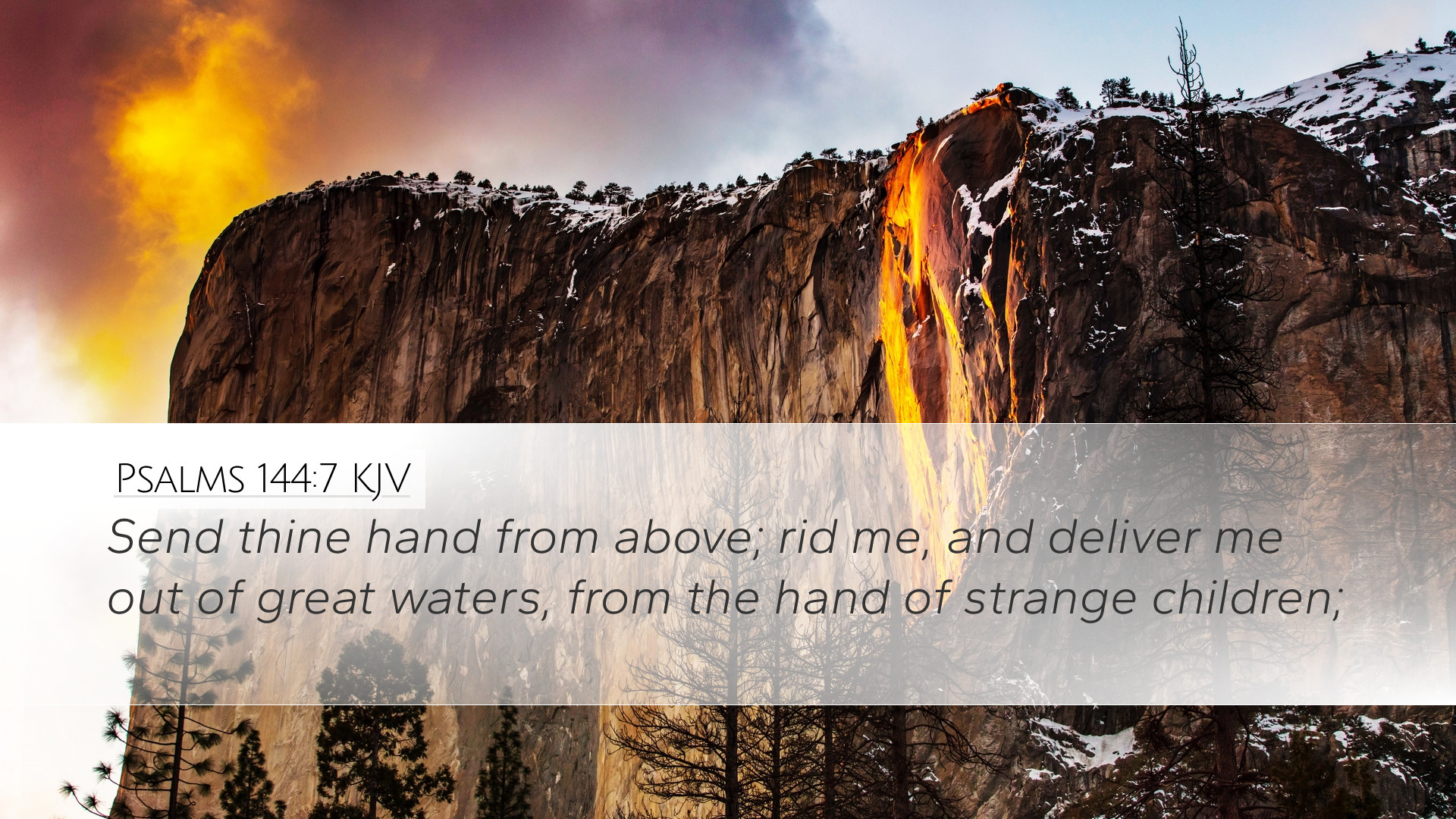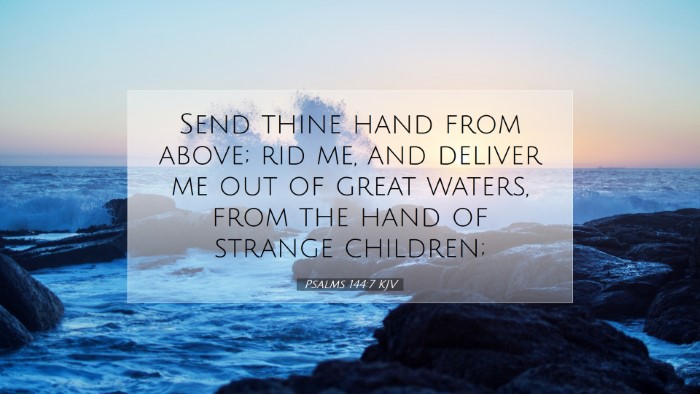Commentary on Psalms 144:7
Bible Verse: "Send thine hand from above; rid me, and deliver me out of great waters, from the hand of strange children."
Introduction
Psalms 144:7 is a poignant plea for divine intervention, encapsulating the essence of human vulnerability and the reliance on God's strength and mercy. The psalmist, likely David, invokes God’s power to rescue him from tumultuous challenges, often interpreted as metaphors for spiritual and physical adversities faced in life.
The Context of Psalms 144
This psalm is part of a collection attributed to David, echoing themes of warfare, divine protection, and praise. It stands as a reflection of both gratitude for past deliverances and intense longing for future assistance. Understanding Psalms 144 requires recognizing it as a royal psalm that intertwines personal supplication with nationalistic sentiments of Israel.
Verse Breakdown
“Send thine hand from above”
Here, the psalmist acknowledges the sovereignty of God and His ability to intervene from on high. Notably, Matthew Henry observes that the phrase emphasizes the need for a transcendent help, suggesting that earthly efforts are futile without divine support. The 'hand from above' symbolizes God’s active involvement in the affairs of men and His capability to manipulate circumstances.
“Rid me, and deliver me”
This plea reflects a deep desperation and acknowledges the psalmist's inability to save himself. Adam Clarke points out that the dual request for 'ridding' and 'delivering' signifies a comprehensive liberation. To be 'rid' implies getting free from oppression, while 'deliver' conveys the idea of being rescued from imminent danger. This duality highlights the psalmist's awareness of both his internal struggles and external threats.
“Out of great waters”
The imagery of 'great waters' is prevalent in biblical literature, often depicting chaos, danger, and overwhelming circumstances. Albert Barnes interprets 'great waters' as a symbol of adversarial forces and tribulations—akin to the many challenges faced by believers. This metaphor speaks to the depth of trials, suggesting that these experiences can feel limitless, yet they are not beyond God's reach.
“From the hand of strange children”
The term 'strange children' likely refers to foreign adversaries or enemies that threaten God's people. This phrase evokes a sense of alienation and danger. Henry indicates that these 'strange children' can represent forces that are not only physically estranged but also ideologically opposed to the values embodied in God's covenant community. It serves as a reminder of the spiritual warfare faced by believers in any age.
Theological Insights
God’s Sovereignty and Providence
This verse profoundly emphasizes God as the ultimate protector. The request for divine intervention demonstrates faith in God's providential care. The acknowledgment of God’s sovereignty reassures the believer that even in the face of grave challenges, divine help is both necessary and attainable.
The Nature of Deliverance
Deliverance in this context transcends mere physical safety; it speaks to spiritual restoration and the holistic well-being of the believer. Clarke articulates the idea that rescuing 'from great waters’ also involves being freed from the 'waves of sin' that can threaten spiritual vitality. The deliverance sought encompasses every facet of life and underscores the interconnectedness of spiritual and physical realities.
The Community Aspect of Deliverance
The mentions of 'strange children' not only relate to personal danger but also suggest communal threats to Israel as a nation. This perspective is critical for understanding the corporate dimension of suffering and deliverance in the biblical narrative. There is a profound sense of solidarity among believers in recognizing that they face common challenges that necessitate collective prayer and reliance on God.
Practical Applications
Encouragement in Desperation
Psalms 144:7 serves as a source of hope for anyone navigating tumultuous life situations. The articulation of need encourages believers to bring their challenges directly to God. It acts as a reminder that in moments of distress, one’s dependence on divine strength is not a sign of weakness but an acknowledgment of one’s limitations.
The Call for Prayer
This verse can prompt believers and communities to engender a culture of prayer that seeks divine intervention. Regular prayer within the church setting, especially in times of trouble, can foster a stronger sense of unity and reliance on God’s grace.
Awareness of Spiritual Warfare
The phrase 'strange children' calls attention to the reality of spiritual warfare. Pastors and theologians can use this verse as a teaching tool to prepare congregations for the spiritual battles they face, understanding that our struggle is not just against flesh and blood but against principalities and powers (Ephesians 6:12).
Conclusion
Psalms 144:7 is a powerful articulation of a heartfelt cry for help, bringing together themes of divine sovereignty, human need, and the broader context of communal and personal deliverance. It resonates with the experiences of believers through generations, depicting a timeless truth: that in moments of great trial, it is the hand of God that can provide the refuge and deliverance sought. For pastors, students, and scholars, this verse invites profound reflection and encouragement in faith.


